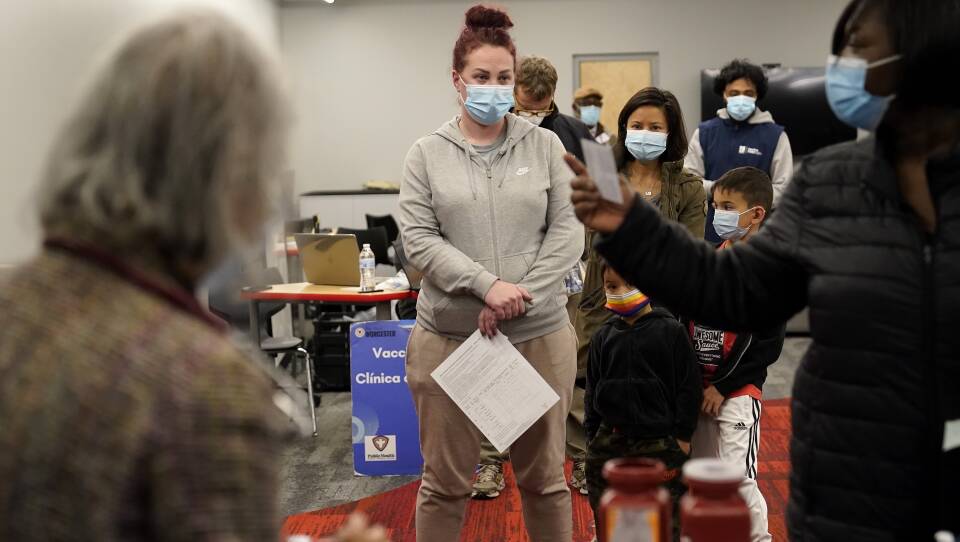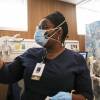Updated 11:01 a.m. on Feb. 8
Worcester today became the latest Massachusetts community to rescind its indoor mask mandate as the omicron variant–fueled surge in COVID-19 cases subsides.
The city’s board of health voted 3-2 to end the requirement, effective Feb. 18, citing a decline in new cases and patients hospitalized for COVID-19. Colleges and workplaces in the city with at least a 90% vaccination rate will be exempt from the mask mandate beginning Tuesday.
“It’s safe now to not require our residents in the city to wear masks,” said board member Gary Rosen, who supported rescinding the mandate. “There comes a time when our government can say to us, ‘You’re safe.’”
The city instituted the mask requirement about five months ago. In advance of tonight's vote, Michael Hirsch, Worcester’s medical director, had recommended the board drop the rule.
“We didn’t make this decision lightly,” he said. “We’ve been hearing so much how personal choice is important to our citizens and mandates have denied them that. So we are giving a choice now.”
The end of Worcester’s mask mandate does not extend to K-12 public, charter and parochial schools, which are requiring masks until at least Feb. 28, in accordance with statewide guidance. Masking requirements also still apply on public transit, following state and federal guidelines.
Hirsch said people who are unvaccinated or immunocompromised should continue to wear masks.
Officials also said private businesses in the city can implement their own mandates.
Worcester officials note that COVID-19 cases in Worcester have dropped precipitously since the omicron surge peaked in early January. Average daily COVID-19 case counts are down more than 1,000 over the past month. Local hospitals report decreasing overall admissions due to the virus, though deaths and intensive care unit admissions — which usually rise weeks after a bump in new infections — are still increasing.
Board members Chareese Allen and Khanh Van Tran voted against ending the mandate, noting those trends in severe illness and deaths. They added that the virus continues to disproportionately impact the city’s communities of color, which have lower vaccination rates.
“I am very leery and really concerned that we may go through another surge of COVID because we don’t have enough boosted population,” Allen said.
Worcester’s Black and Latino communities have contracted COVID-19 at higher rates than white residents. The city’s vaccination and booster rates — 60% and 26%, respectively — also lag behind statewide averages. Hirsch and board chair Jerry Gurwitz said the city should focus not on masks, but vaccination outreach efforts, to address those disparities.
“Things are not close to perfect by any means,” said Gurwitz, who voted to end the mandate. “Everything right now is in vaccination. And we can’t take our foot off the gas relating to that.”
The end of the city’s mask mandate corresponds with Worcester ending other pandemic restrictions. The city announced Friday that it will reopen all public buildings to visitors on Feb. 14, and City Council and other boards will resume meeting in person.
Hirsch said that if officials see signs of COVID-19 cases increasing again, they will consider implementing another mask mandate.
Worcester joins several other Massachusetts communities ending indoor mask mandates, including Lowell, Beverly and Mansfield . Sudbury and Salem’s boards of health will evaluate their respective mask requirements Tuesday, according to agendas posted on the cities’ websites.
Not all Massachusetts localities are ready to relax the pandemic precaution. During a Belmont Health Department meeting this afternoon, members expressed concern over still-high hospitalization rates. They also argued that many young students remain unvaccinated and the coming February school break could lead to more families traveling, elevating people’s risk of contracting COVID-19.
“We see the end of the masking coming,” board chair Donna David said during the meeting. “We're willing to take a look at this, and we're hopeful to make changes at our March meeting, which would be after the February break.”
Correction: Due to an editing error, an earlier version of this story incorrectly identified Michael Hirsch's position. He is the city's medical director.





![Graduation 2024[64].jpg](https://cdn.grove.wgbh.org/dims4/default/21b7226/2147483647/strip/true/crop/1358x1358+637+0/resize/100x100!/quality/70/?url=https%3A%2F%2Fk1-prod-gbh.s3.us-east-2.amazonaws.com%2Fbrightspot%2F3a%2Feb%2Fd00d5cf6443ebee7970df751d611%2Fgraduation-202464.jpg)


